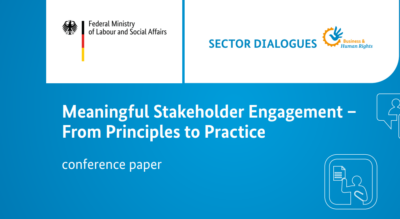Multi-stakeholder partnerships (MSPs) can be divided into different types, depending on their thematic focus and emphasis. Although many MSPs integrate a variety of activities into their work and the distinction is not always clear, it is nevertheless helpful to differentiate between different types of MSPs: Standardization partnerships, service partnerships and knowledge partnerships.
The aim of standardization partnerships is to establish uniform standards. These partnerships establish industry-wide or cross-sector standards, that all stakeholders involved are required to comply with. Service partnerships aim to provide services that are of benefit to the actors involved. Knowledge partnerships promote the exchange and generation of knowledge. The transfer of information, research findings and best practices serve to strengthen the capacities of the actors involved.
One example of a knowledge partnership is the MSP Global Alliance for Care (GAC), which is dedicated to the topic of care work. The GAC was jointly initiated by the Mexican government through the National Institute for Women (INMUJERES) and UN Women and launched as part of the Generation Equality Forum 2021 in the context of the Coalition for Action for Economic Justice and Rights. The Alliance consists of over 180 members, including caregiver and care recipient organizations, civil society organizations, trade unions, academic institutions, local, national and regional governments as well as international and multilateral organizations, international development aid, foundations and the private sector.
GAC promotes cross-sectoral and international dialogue, analysis and exchange of experience on care work and recognizes it as a need, a job and a right. GAC thus creates spaces for collective learning, experience sharing and the dissemination of data and knowledge about care work and supports cultural change in this area. A comprehensive network can be created through the exchange of knowledge and joint learning. The international character and the different perspectives brought in by the multi-stakeholder approach are particularly promising. In addition to sharing information, the GAC also publishes joint reports and publications and offers its members and all interested parties a platform for sharing knowledge on its website: infographics, reports, articles, podcasts, videos, essays and much more on the topic of care work from different regions and in different languages. In addition, joint events and forums provide a platform for exchange and discussion, informing members about important developments and opportunities related to the care agenda, enabling horizontal learning and knowledge exchange on care policies, best practices, and giving them the opportunity to participate in discussions and campaigns through the network and to develop new, transformative narratives in the field of care.
More about care work and the Global Alliance for Care can be found at: Home – Alianza Global por los Cuidados / Global Alliance for Care



